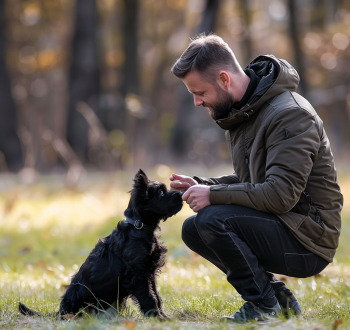Caring for Your Furry Friend: Essential Tips for New Dog Owners
Welcoming a new dog into your home is an exciting and rewarding experience, but it also comes with responsibilities. As a new dog owner, it’s important to provide your furry friend with the care, love, and attention they need to thrive. This article offers essential tips to help you navigate the journey of dog ownership and ensure a happy and healthy life for your canine companion.
1. Establish a Routine
Dogs thrive on routine, so it’s essential to establish a consistent schedule for feeding, walking, playtime, and bedtime. A predictable routine helps your dog feel secure and reduces stress and anxiety.
- Feeding: Feed your dog at the same times each day, ideally in two or three meals to prevent overeating. Choose high-quality, balanced dog food appropriate for your dog’s age, size, and breed.
- Walking: Aim for at least one or two walks per day, depending on your dog’s energy level and breed. Regular exercise is essential for physical and mental health.
- Playtime: Set aside time each day for interactive play and bonding with your dog. Use toys to engage them mentally and physically.
- Bedtime: Establish a bedtime routine that includes a comfortable sleeping area for your dog. A cozy bed in a quiet, secure location is ideal.
2. Provide Proper Nutrition
Good nutrition is key to your dog’s overall health and well-being. Choose a high-quality dog food that meets their nutritional needs and avoids fillers and artificial ingredients. Consider factors such as age, size, activity level, and any specific dietary requirements or allergies.
- Consult Your Veterinarian: Talk to your veterinarian about the best diet for your dog. They can recommend specific foods and feeding guidelines based on your dog’s individual needs.
- Monitor Portion Sizes: Avoid overfeeding your dog, as obesity can lead to health problems. Follow the recommended portion sizes provided by the food manufacturer or your veterinarian.
- Fresh Water: Make sure your dog always has access to fresh, clean water. Hydration is essential for their overall health and digestion.
3. Exercise Regularly
Regular exercise is essential for keeping your dog physically and mentally healthy. Aim for a mix of aerobic exercise, such as walking or running, and mental stimulation through games and training activities.
- Daily Walks: Take your dog for daily walks to provide exercise, mental stimulation, and opportunities for socialization.
- Playtime: Incorporate interactive play sessions into your daily routine to keep your dog engaged and entertained. Use toys, fetch games, and puzzle toys to stimulate their mind and body.
- Training: Training sessions not only teach your dog basic commands but also provide mental stimulation and strengthen your bond. Use positive reinforcement techniques, such as treats and praise, to reward good behavior.
4. Maintain Regular Veterinary Care
Regular veterinary care is essential for keeping your dog healthy and preventing health problems. Schedule routine check-ups with your veterinarian and stay up-to-date on vaccinations, parasite prevention, and dental care.
- Annual Wellness Exams: Take your dog to the veterinarian for a thorough check-up at least once a year. These exams help detect any health issues early and ensure your dog is in good health.
- Vaccinations: Follow your veterinarian’s recommendations for vaccinations to protect your dog against common diseases.
- Parasite Prevention: Use preventive measures such as flea, tick, and heartworm preventives to protect your dog from parasites.
- Dental Care: Practice good dental hygiene by brushing your dog’s teeth regularly and providing dental treats or toys to promote oral health.
5. Create a Safe Environment
Ensure your home is a safe and comfortable environment for your dog by addressing potential hazards and providing essential amenities.
- Dog-Proof Your Home: Remove or secure hazardous items such as toxic plants, household chemicals, and small objects that could be swallowed.
- Provide Shelter: Create a designated sleeping area for your dog that is comfortable, quiet, and free from drafts.
- Secure Fencing: If you have a yard, make sure it is securely fenced to prevent your dog from wandering off or encountering dangerous situations.
- Supervise Outdoors: Always supervise your dog when they are outdoors to prevent accidents, injuries, or encounters with other animals.
6. Practice Positive Reinforcement Training
Positive reinforcement training is a humane and effective way to teach your dog good behavior and strengthen your bond. Use rewards such as treats, praise, and affection to encourage desired behaviors and discourage unwanted ones.
- Consistency: Be consistent with your training methods and expectations to avoid confusion. Use clear, positive commands and reward your dog for following them.
- Patience: Training takes time and patience, so be patient with your dog and avoid punishment or harsh methods, which can damage your relationship and cause anxiety.
- Socialization: Expose your dog to various people, animals, environments, and experiences from a young age to help them develop social skills and confidence.
7. Provide Love and Affection
Above all, shower your dog with love, affection, and attention. Dogs thrive on human companionship and form deep bonds with their owners





